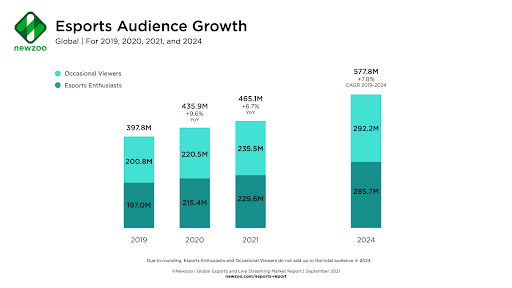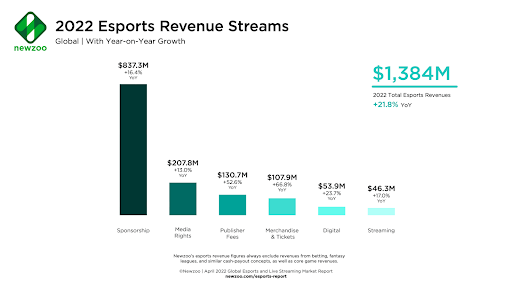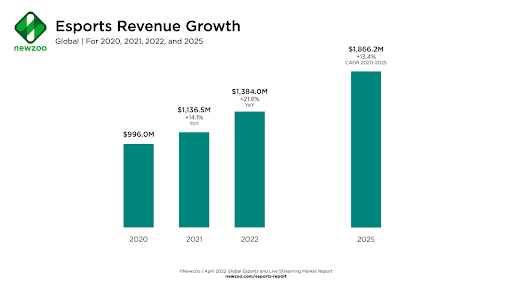October 5, 2022
The esports industry has seen tremendous growth over the years and, as we’ve said in previous articles, it’s going to keep growing both in terms of viewership and revenue.Seeing the potential of reaching a large and engaged audience, brands are investing more and more in esports marketing.

Source: Newzoo
One of the main reasons for this growth is that more people are discovering esports. There has been a tremendous rise in awareness of the esports industry in the last five years. This engagement increase translates into more revenue in the esports market.
Marta Juras (Business Development Associate at WIN.gg) defines a Partnership Manager as “someone who brings new partners to an organization, handles the terms of a partnership, and makes sure the deal comes through properly.” A partnership manager is a combination between sales and marketing, as they need to bring new partners on board and keep and manage those relationships to assure success.

Source: Newzoo
You may be wondering, why does an organization hire a Partnership Manager? Organizations choose to hire Partner Managers when they have developed goals and laid out a strategy for their partner program. Partner Managers focus on executing that strategy and are tied to growth and expansion into new verticals or territories. So, simply put, to make money. As Marta says, ‘”if you’re selling a partnership, you’re earning revenue. If you’re buying it or entering a mutual interest partnership, you’re looking to increase your impressions and other key metrics with the ultimate goal of increasing your revenue.”

Source: Newzoo
So, without further delay, let’s analyze some of the responsibilities a Partnership Manager has to take care of.
Developing and maintaining relationships
As the name itself indicates, a Partner Manager is responsible for cultivating, maintaining, and developing relationships among business partners. They need to build and sell the brand to attract partners, and then keep the relationship and keep in contact to sustain that relationship.
Marta Jura tells us that communication and openness to criticism are two key skills to develop this job successfully: “Communication and openness to criticism first because you can’t shy away from plenty of meetings with (initially) strangers. Moreover, when you’re pitching a partnership plan, you need to be confident and elaborate on what you’re saying, and know which questions to ask to learn what the potential partner is looking for. Partners on the other end will always have questions and worries, and it’s up to you to assure them that your company and you as the person running the partnership are an excellent choice for them.
Once the partnership is signed, you’re the one that’s keeping up with all the conversations. Of course, your results won’t be ideal every single time, so some of those conversations can be unpleasant, but it’s all a part of the job.”
You must also be able to differentiate when a relationship should be maintained and when it will be more beneficial for the company and the strategy to break ties.
Keep your clients and partners updated
A Partner Manager should be able to analyze and report on partner initiatives, forecast for strategic changes, and report on key metrics. What does this mean? That you need to be able to evaluate if what you’re implementing is providing the expected results. If it’s not, it is time to consider a change of action; if it is, it may be the moment to investigate if it would be possible to improve the results, to get to the next step. All this while providing the right information to your client and keeping them up to date.
Developing and executing plans for strategic growth
The main reason a Partner Manager is hired (aside from the wish from the company to make more money) is so they can bring to life the vision the company has in mind. A Partner Manager has to guide the path towards the strategy. Providing advice, feedback, and asking the right questions to develop the ideal track to reach the established goals.
Stay up-to-date with the market
If you want to sell something, you need to know in which context you are operating: what is popular at the moment, what gets visits, what works and what to avoid, what contacts to make that are going to be beneficial at the moment, how to direct the leads in our interest, etc. A good Partner Manager knows the market they are working on and stays up-to-date through exhaustive research.
As Marta puts it, “To create a good marketing plan for your partnership, you need to know what your audience is into, what’s currently popular, their attention spawn, and what kind of language reaches out to them. This is especially true in gaming and esports because you’ll often find non-gaming-related companies wanting to enter the industry and entirely relying on your expertise.”
So, even if your company doesn’t understand the audience or industry they’re working on, you need to be the expert in providing a good strategic plan and guiding their path.
Keep organized and build an ecosystem
A Partnership Manager should not be shy about seeking out new connections or asking for an introduction – going back to one of the key skills of a Partner Manager: communication. They should maintain a large network by getting to know the needs and strengths of other partners, so to find valuable opportunities and act fast to foster new relationships. They should be making connections that deliver mutual value.
Great organization skills are crucial. Many relationships and partnerships require a clean and organized schedule and notes; you don’t want to miss a meeting or mess up some data. Marta stresses,“as a manager in partnerships, you need to keep track of all the ongoing partnerships and all the prospecting you’re doing as well. Plenty of meetings, lots of excel sheets, working with lots of different people, and you don’t want to mix things up. I keep track of my daily tasks through a notebook planner, meetings through Google Calendar, and projects through Trello or Asana boards. Tools like Trello and Asana are fantastic for keeping track of your tasks, notes, and files in one place, but having a daily plan is important if you don’t want to lose time trying to remember what’s what.”
Those are just five basic responsibilities of a Partner Manager, but I hope it is a good start to understanding this position in a company, and Marta provided us with some insight on how to get started if we want to follow this career path:
“Work really, really hard. Any career-building requires your indispensable attention, and you can’t do it by being an average worker. Show how much you know and never stop learning. Our space is so incredibly competitive nowadays as it grows at incredible speed; everyone wants to be a part of it, so just being a passionate gamer and going with a ‘gamers for gamers’ strategy alone just won’t do anymore. Take all the feedback you can get to the heart and improve your skills every day.
In partnerships, marketing, sales – and generally positions that include a higher level of responsibility and authority – it’s required to have previous knowledge or experience. I graduated in international business and had a few years of experience during various jobs in esports, from freelance writing to social media. It’s essential to show you’re willing to work.
Thankfully, free work is becoming less and less of a standard in esports nowadays, so I’m not necessarily saying do free work (as I did back when our industry was still a lot younger). However, I encourage volunteering for good causes like women’s and LGBTQ+ or charity initiatives or helping out a friend trying to make it as a content creator.”
So if you’re out there, searching to enter this amazing and dynamic world, don’t dawdle, and don’t be afraid. There’s a place for everyone in the esports industry, but you have to put the work in as with anything else. I’m always keen to say the harder you work, the luckier you get. I’m working on believing that myself, but it won’t hurt to spread a bit of positivity around, will it?
Conclusion
As a Partnership Manager you need to be empathetic, curious, and confident with strong abilities in communication, relationship building, negotiation, and critical thinking. In addition, you need to have experience in both sales and marketing and be able to analyze metrics and other types of data. It is a complex job and is likely to be strongly based on previous experience, but don’t let this stop you.
As a bonus, I asked Marta to describe a day in the job, so you can have a nice feel for how someone develops in the position daily:
“Days can be very different. Some days are taken by market research and prospecting; finding new partnership opportunities, reaching out to other brands, and trying to get sales calls in. Generally, I’ll have meetings with partners to talk about what they want from the partnership, what kind of content we can produce for them, and give direction on what type of content will work the best in our space for a high turnover.
Some partners are interested in sponsorships, others maybe want a social campaign or a simple advertisement, and some come open to learning about opportunities. That means that sometimes, we might also conclude our audiences don’t overlap enough, and we won’t go forward with the partnership, or the partnership will continue simply by us helping them do marketing in the gaming space.
There’s also a lot of communication with already ongoing partnerships. For example, reporting on KPIs, gaining feedback, and keeping them updated on current performance and next steps. And of course, all of this needs to be communicated to your team that produces content (writers, digital designers, editors, influencers, pros, …) in what needs to be done, how and when.”
I hope this article will help you become familiar with certain professions in the world (I previously wrote the article about esports coaches – check it out!). All esports and videogame enthusiasts can find their niche in the industry (including me).
There will be more of this series in the future, so stay tuned!
